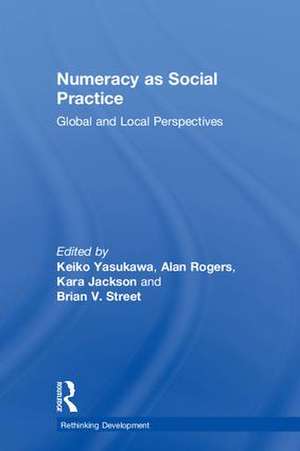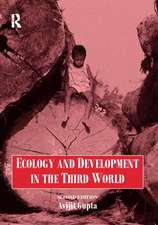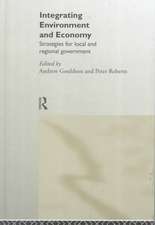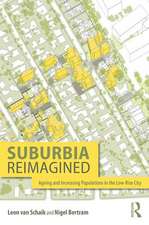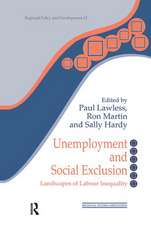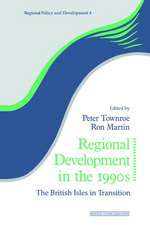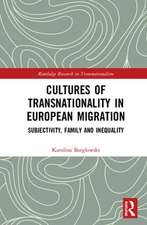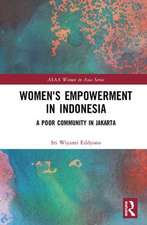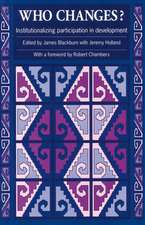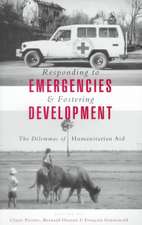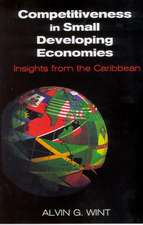Numeracy as Social Practice: Global and Local Perspectives: Rethinking Development
Editat de Keiko Yasukawa, Alan Rogers, Kara Jackson, Brian V. Streeten Limba Engleză Hardback – 7 mai 2018
Drawing on workplace, community and classroom contexts, Numeracy as Social Practice shows how everyday numeracy practices can be used in formal and non-formal maths teaching and how, in turn, classroom teaching can help to validate and strengthen local numeracy practices. At a time when an increasingly transnational approach is taken to education policy making, this book will appeal to development practitioners and researchers, and adult education, mathematics and numeracy teachers, researchers and policy makers around the world.
| Toate formatele și edițiile | Preț | Express |
|---|---|---|
| Paperback (1) | 388.08 lei 6-8 săpt. | |
| Taylor & Francis – mai 2018 | 388.08 lei 6-8 săpt. | |
| Hardback (1) | 1001.84 lei 6-8 săpt. | |
| Taylor & Francis – 7 mai 2018 | 1001.84 lei 6-8 săpt. |
Din seria Rethinking Development
-
 Preț: 288.80 lei
Preț: 288.80 lei -
 Preț: 279.66 lei
Preț: 279.66 lei -
 Preț: 215.16 lei
Preț: 215.16 lei - 8%
 Preț: 381.60 lei
Preț: 381.60 lei -
 Preț: 284.73 lei
Preț: 284.73 lei -
 Preț: 265.01 lei
Preț: 265.01 lei -
 Preț: 311.06 lei
Preț: 311.06 lei -
 Preț: 293.88 lei
Preț: 293.88 lei -
 Preț: 175.80 lei
Preț: 175.80 lei -
 Preț: 266.27 lei
Preț: 266.27 lei -
 Preț: 279.32 lei
Preț: 279.32 lei -
 Preț: 303.30 lei
Preț: 303.30 lei -
 Preț: 302.16 lei
Preț: 302.16 lei - 18%
 Preț: 996.96 lei
Preț: 996.96 lei -
 Preț: 354.32 lei
Preț: 354.32 lei -
 Preț: 323.28 lei
Preț: 323.28 lei - 18%
 Preț: 999.02 lei
Preț: 999.02 lei - 20%
 Preț: 298.64 lei
Preț: 298.64 lei -
 Preț: 295.76 lei
Preț: 295.76 lei -
 Preț: 356.44 lei
Preț: 356.44 lei -
 Preț: 326.90 lei
Preț: 326.90 lei - 18%
 Preț: 1164.44 lei
Preț: 1164.44 lei -
 Preț: 410.46 lei
Preț: 410.46 lei -
 Preț: 356.44 lei
Preț: 356.44 lei -
 Preț: 353.02 lei
Preț: 353.02 lei -
 Preț: 355.90 lei
Preț: 355.90 lei - 26%
 Preț: 763.39 lei
Preț: 763.39 lei -
 Preț: 442.88 lei
Preț: 442.88 lei -
 Preț: 287.61 lei
Preț: 287.61 lei - 18%
 Preț: 1001.84 lei
Preț: 1001.84 lei -
 Preț: 350.82 lei
Preț: 350.82 lei - 25%
 Preț: 768.30 lei
Preț: 768.30 lei - 18%
 Preț: 999.34 lei
Preț: 999.34 lei -
 Preț: 283.67 lei
Preț: 283.67 lei -
 Preț: 383.92 lei
Preț: 383.92 lei -
 Preț: 350.82 lei
Preț: 350.82 lei - 18%
 Preț: 1001.90 lei
Preț: 1001.90 lei - 26%
 Preț: 764.20 lei
Preț: 764.20 lei - 26%
 Preț: 764.20 lei
Preț: 764.20 lei
Preț: 1001.84 lei
Preț vechi: 1221.75 lei
-18% Nou
Puncte Express: 1503
Preț estimativ în valută:
191.70€ • 200.15$ • 158.66£
191.70€ • 200.15$ • 158.66£
Carte tipărită la comandă
Livrare economică 05-19 aprilie
Preluare comenzi: 021 569.72.76
Specificații
ISBN-13: 9781138284449
ISBN-10: 1138284440
Pagini: 278
Ilustrații: 52
Dimensiuni: 156 x 234 x 18 mm
Greutate: 0.5 kg
Ediția:1
Editura: Taylor & Francis
Colecția Routledge
Seria Rethinking Development
Locul publicării:Oxford, United Kingdom
ISBN-10: 1138284440
Pagini: 278
Ilustrații: 52
Dimensiuni: 156 x 234 x 18 mm
Greutate: 0.5 kg
Ediția:1
Editura: Taylor & Francis
Colecția Routledge
Seria Rethinking Development
Locul publicării:Oxford, United Kingdom
Public țintă
Postgraduate, Professional, and UndergraduateNotă biografică
Keiko Yasukawa is an adult numeracy and literacy researcher and teacher educator at the University of Technology Sydney in Australia.
Alan Rogers is an adult educator and Visiting Professor at the universities of East Anglia and Nottingham, UK.
Kara Jackson is an Associate Professor of Mathematics Education at the University of Washington, Seattle, USA.
Brian V. Street was an anthropologist, formerly Professor of Language in Education at King’s College, London, UK, and Visiting Professor of Education at the University of Pennsylvania, USA.
Alan Rogers is an adult educator and Visiting Professor at the universities of East Anglia and Nottingham, UK.
Kara Jackson is an Associate Professor of Mathematics Education at the University of Washington, Seattle, USA.
Brian V. Street was an anthropologist, formerly Professor of Language in Education at King’s College, London, UK, and Visiting Professor of Education at the University of Pennsylvania, USA.
Recenzii
"The volume brings numeracy as social practice to life in ethnographic case studies of everyday numeracy practices and mathematics education in diverse international settings. Different theoretical perspectives are woven across the chapters, including New Literacy Studies, cultural-historical activity theory, critical theory and ethnomathematics. The editors masterfully craft all this into a coherent volume useful to researchers and mathematics educators around the world." -- Stephen Reder, Portland State University, USA
"This lucid account of numeracy as social practice is much needed and long overdue. It features an admirably broad scope and diversity, with chapters from every continent and from various educational, work, and other everyday settings. I especially like the discussions on relations between everyday numeracy practices and more formal mathematics, the invisibility of numeracy practices, and the importance of attending to power relations." -- Jeff Evans, Reader Emeritus, Middlesex University, London, UK
"This pioneering publication is timely in that the importance of learning as a social practice, especially numeracy as a social practice, is increasingly being understood and recognized by those concerned with quality education, formal/non-formal/lifelong/life-wide education. Rooted in a number of relevant research studies from around the world, and informed by theoretical influences highlighting the ‘social practices perspective on numeracy’, the authors engage the educators and researchers in broadening their vision of numeracy. This is a valuable resource book for researchers, activists and educators." L S Saraswathi, Social Activist, Trainer and Researcher in Development, Chennai, India
"The book Numeracy as Social Practice offers a wide and very well-structured perspective on a topic which is well known from research and discussion on literacy but which is less prominent regarding numeracy. The book not only states that numeracy learning is lifelong and life-wide but also proves this position by the variety of different contributions. We very much appreciate the fact that the authors of the individual chapters have made an impressive regional diversity possible. Moreover, they offer insights into a diverse range of educational contexts, reaching from schools to vocational education to adult basic education. The examples in the different chapters show that mathematical experiences might be mostly invisible in everyday lives, but they still exist and need a closer connection to educational programs. Acknowledging these experiences helps to reflect adequately on the deficit orientation in current discourses about competences and to criticize it in a well-founded way." – Book Review by Anke Grotlüschen and Klaus Buddeberg in Educational Studies in Mathematics journal
"This lucid account of numeracy as social practice is much needed and long overdue. It features an admirably broad scope and diversity, with chapters from every continent and from various educational, work, and other everyday settings. I especially like the discussions on relations between everyday numeracy practices and more formal mathematics, the invisibility of numeracy practices, and the importance of attending to power relations." -- Jeff Evans, Reader Emeritus, Middlesex University, London, UK
"This pioneering publication is timely in that the importance of learning as a social practice, especially numeracy as a social practice, is increasingly being understood and recognized by those concerned with quality education, formal/non-formal/lifelong/life-wide education. Rooted in a number of relevant research studies from around the world, and informed by theoretical influences highlighting the ‘social practices perspective on numeracy’, the authors engage the educators and researchers in broadening their vision of numeracy. This is a valuable resource book for researchers, activists and educators." L S Saraswathi, Social Activist, Trainer and Researcher in Development, Chennai, India
"The book Numeracy as Social Practice offers a wide and very well-structured perspective on a topic which is well known from research and discussion on literacy but which is less prominent regarding numeracy. The book not only states that numeracy learning is lifelong and life-wide but also proves this position by the variety of different contributions. We very much appreciate the fact that the authors of the individual chapters have made an impressive regional diversity possible. Moreover, they offer insights into a diverse range of educational contexts, reaching from schools to vocational education to adult basic education. The examples in the different chapters show that mathematical experiences might be mostly invisible in everyday lives, but they still exist and need a closer connection to educational programs. Acknowledging these experiences helps to reflect adequately on the deficit orientation in current discourses about competences and to criticize it in a well-founded way." – Book Review by Anke Grotlüschen and Klaus Buddeberg in Educational Studies in Mathematics journal
Cuprins
List of Figures List of Boxes List of Tables List of Contributors FOREWORD INTRODUCTION Chapter 1 Mapping the terrain of social practice perspectives of numeracy Keiko Yasukawa, Kara Jackson, Phil Kane and Diana Coben PART I Using case studies to expose the significance of what ‘surrounds’ mathematics in numeracy practices Preface Alan Rogers and Brian V. Street Chapter 2 Estimation by kiwifruit orchard managers and urban refuse/recycling operators within their situated horticultural or civic workplace practices: Case studies from New ZealandPhil Kane Chapter 3 Building stone walls: A case study from the Phillipines Wilfredo Vidal Alangui Chapter 4 Tear it out and rip it up or you might get charged again: Paying debts at the company store in a farm workers’ camp in MexicoJudy Kalman and Diana Solares Chapter 5 Mathematics in pre-vocational education: A model for interfaces between two different teaching contentsLisa Björklund Boistrup, Elisabet Bellander and Michael Blaesild PART II Mathematics education and everyday numeracies: Theoretical resources for analysis PrefaceKeiko Yasukawa Chapter 6 Word problems as social textsRichard Barwell Chapter 7 Broadening school mathematics curriculum: The complexity of teaching mathematical language games of different forms of lifeGelsa Knijnik and Fernanda Wanderer Chapter 8 ‘Limits of the local’ in theorising numeracy as social practice: A case study of mathematics education in PalestineJehad Alshwaikh and Keiko Yasukawa Chapter 9 Teaching and learning of numeracy in Nepalese primary schoolsMariko Shiohata PART III Numeracy and power: Facilitating learning of numeracy as social practice PrefaceKara Jackson Chapter 10 ‘Occupation of our minds’: A metaphor to explain mathematics education in South Africa in the apartheid eraHerbert Khuzwayo Chapter 11 Learning for life, from life: Adult numeracy and primary school textbooks in IndiaAnita Rampal Chapter 12 Critical humanistic pedagogy in the context of adult basic education: Making sense of numeracy as social empowermentRebecca Nthogo Lekoko, Shanah Mompoloki Suping and Obusitswe Pitso Chapter 13 The workplace as a site for learning critical numeracy practiceKeiko Yasukawa CONCLUSION Chapter 14 Expanding and deepening the terrain: Numeracy as social practiceKara Jackson, Alan Rogers and Keiko Yasukawa
Descriere
This book is perfect for development practitioners, adult education teachers and policy makers, as well as scholars and students within development studies and numeracy education.
